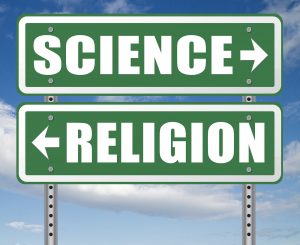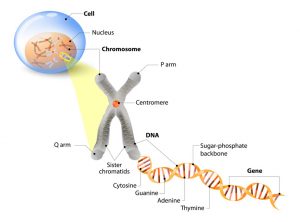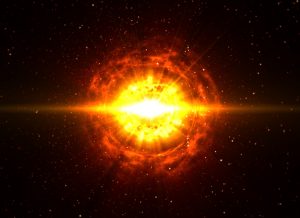This post is for all of us who have struggled with the “faith vs. science” conundrum.
 I do not profess to be a Steven Pinker, a scientist, theologian, philosopher, or great thinker. I am just a guy. But for over twenty years I’ve read and studied experts on the three big questions that, if answered, largely define our earthly existence: creation, the emergence of life, and macroevolution.
I do not profess to be a Steven Pinker, a scientist, theologian, philosopher, or great thinker. I am just a guy. But for over twenty years I’ve read and studied experts on the three big questions that, if answered, largely define our earthly existence: creation, the emergence of life, and macroevolution.
What I ask of great thinkers like Steven Pinker is honesty, consistency, and truth. As I stated in last month’s post, Pinker’s Enlightenment Now: The Case for Reason, Science, Humanism and Progress is an incredibly well researched tour de force that explores the incomparable progress we humans have made during the last 250 years. While I sincerely applaud his optimism in most areas, in that post I used his own words and analyses to show how his progressive beliefs overrode his reason on at least one critical issue.
This month I want to focus on one other area where I believe Pinker to be intellectually inconsistent: the intersection of Faith and Reason, sometimes called Religion vs. Science.
Pinker’s definition on page 30 leaves little room for Faith in a rational world: “To take something on faith  means to believe it without good reason, so by definition a faith in the existence of supernatural entities clashes with reason.” He then misses no opportunity throughout the book to lambast Faith, Religion, and those who believe as, well, deplorables.
means to believe it without good reason, so by definition a faith in the existence of supernatural entities clashes with reason.” He then misses no opportunity throughout the book to lambast Faith, Religion, and those who believe as, well, deplorables.
“Few sophisticated people today profess a belief in heaven and hell, the literal truth of the Bible, or a God who flouts the laws of physics.” (p. 430). I’m not sure how sophisticated I am, but I’m reasonably intelligent and educated, and I do profess these beliefs.
Moreover, I believe it to be perfectly rational to have this Faith. And I conclude that Pinker, like all of us, actually operates by Faith—he just won’t admit it.
Let’s work chronologically backward through those three big questions.
Macroevolution vs Design. Pinker writes: “Organisms are replete with improbable configurations of flesh like eyes, ears, hearts, and stomachs which cry out for an explanation. Before Charles Darwin and Alfred Russel Wallace provided one in 1859, it was reasonable to think that they were the handiwork of a divine designer…Darwin and Wallace made the designer unnecessary.” (p. 18)

There is so much interesting and very readable literature on this subject that I added an Appendix at the end of this post with just some of the links. But one in particular I want to single out. Throughout his book Pinker invokes Thomas Nagel as an expert, citing him at least seven times. Yet Nagel, a secular humanist, wrote a scathing destruction of Darwin’s theories in his book Mind and Cosmos, or Why the Neo-Darwinian Conception of Nature is Almost Certainly False, which Pinker never mentions. In 2013 I wrote a post about Nagel’s conclusions.
It’s hard to overstate how important it is that MacroEvolution is actually not even close to a proven fact, because writers like Pinker use it, with a swift wave of the hand, to dismiss any discussion of Intelligent Design. Without Darwin, that wave of the hand collapses, leaving a real mess for those who don’t want to imagine that there might actually be a Creator.
The Emergence of Life on Earth. Pinker writes: “We know that our species is a tiny twig of a genealogical tree that embraces all living things and that emerged from prebiotic chemicals almost four billion years ago.” (p. 394). Once again, Pinker waves his hand and repeats the mantra that we’ve all heard, but which is also not even close to proven science. In fact, just the opposite.

complex constituent parts. Nagel addresses this problem in his book, and If you want to drill into the science, watch James Tour’s very detailed challenge to the “with enough time” concept in his lecture on the near impossibility of using natural processes, as we understand them, to create a complex living cell. If you are not a scientist, you may want to focus on the first ten and particularly the last twenty minutes of his talk.
Again, pulling out this neat but false “fact” about life emerging on Earth leaves the secular humanist with a possible but unproven theory, just like the intelligent design believer has a possible but unproven theory. Either theory can only be accepted on Faith, not as scientific fact. Anyone interested should investigate both, and, again, there are some good links in the Appendix.
Creation. Pinker writes: “The findings of science imply that the belief systems of all the world’s traditional religions and cultures—their theories of the genesis of the world, life, humans and societies—are factually mistaken. We know, but our ancestors did not, that humans belong to a single species of African primate that developed agriculture, government, and writing late in its history.” (p. 394)
Pinker and others understandably point to the creation models in different religions and declare that none of them corresponds with what scientists now believe: that the Big Bang Theory is the best explanation of the beginning of the universe. Fair enough. As an Old Earth Creationist, I understand that the Creation details in the Bible don’t seem possible if taken literally.
But most of us don’t realize that Fred Hoyle only postulated the Big Bang Theory in 1949. Before 
By focusing on the problems with religious creation models, secularists never confront their own equally large problem: Who, what or how created the Big Bang? Something or Someone must have pre-dated the Big Bang. Despite Pinker’s definition of Faith as being unreasonable, it seems perfectly reasonable to me to accept the probability of a Creator by Faith, as a direct conclusion of today’s best scientific understanding, and then to also be curious about what He, She or It intends for this universe, so magnificently created.
For each of these three big questions, NONE of Pinker’s explanations rise to the level of proven scientific fact. They are ALL at best unproven theories. And despite constant repetition in the media and in books like Pinker’s, the secular “foundations” of Darwinism, Life from Nothing, and No Creator are actually the least probable theories, based on the actual science that we now know.

I offer as examples the Big Bang Theory and the recent DNA-driven discovery of “Adam and Eve” in Africa from whom scientists believe we are all descended. The Big Bang is not literally Genesis 1, and this Adam and Eve do not yet come with a Garden, but my points are that 1) only eighty years ago the best scientists would not have agreed with either of these theories, and 2) after some future discoveries the “faith” and “science” theories may converge even more closely.
Returning to Pinker, I believe that he very much operates by Faith. Consider: “We can explain much about the history of the universe, the forces that make it tick, the stuff we’re made of, the origin of living things, and the machinery of life, including our mental life. Though our ignorance is vast (and always will be), our knowledge is astonishing, and growing daily.” (p.385)
If we can only explain “much”, not all, and our ignorance is vast, what do we use to fill in the bits we can’t explain? This is where secularists tend to tie themselves into knots to do anything except imagine the possibility of a Creator. Why? Because that Creator might have intentions and rules for us to live by, and He, She or It may be trying to communicate with us. And that would interfere with our human pride, our determination to be the king or queen of our own creation, doing whatever we want, without those rules or communication interfering. That’s why they slam the door so quickly and powerfully on any suggestion, even from their own colleagues, that a Creator may be at work.
Some secularists have postulated Panspermia to explain how life came to Earth. And Pinker states that perhaps the fine tuning of the constants in our universe is just a random, lucky happening because there are actually multiple universes, of which ours is just one of many (Multiverse Theory). Of course Who created the extraterrestrial life to bring it here, or Who created the multiverses, is not addressed.
Starting at the bottom of page 422 and extending for several pages, Pinker argues how “progress in physics may reveal that the constants are not so finely tuned,” and how the multiverse theory may turn out to be the best explanation of fundamental physical constants. Or not, I guess. By shifting to words like “may” and “if” to explain away what science now tells us about the fine tuning of the universe, isn’t Pinker violating his own rules and invoking a Faith that he currently has “no good reason” to believe, in order to explain how something other than an intelligent Creator designed the universe to be as precise as science now finds it?
Neither Pinker nor I can explain everything. I freely admit that at some point I have to shift to Faith, but as I’ve demonstrated above, I think my Faith is a reasonable conclusion from current scientific understanding. Pinker denigrates Faith as being unreasonable, and yet he has to invoke his own Faith in order to deny that there is a Creator. I actually think my conclusions are more rational, but I won’t criticize Pinker for having faith; I just wish he would stop calling what he has “science”. It is faith.
And simply because different religions have different foundations and conclusions does not make them all wrong. It is perfectly possible that one is actually correct. To say otherwise is to argue that because there are many theories about the origin of the moon, none of them can be right. As a Christian, and after much 
For now, and in summary, “science” can only go so far in any direction, and we have not even touched on the scientifically difficult subjects of morality and consciousness. I recommend that we all spend time reading and researching these subjects, starting, if you like, with the links below, and then spreading out. Go beyond the three subjects included here to study human behavior, relationships, spirituality and morality. Test what you learn against scripture from many religious faiths, and against Pinker’s secular faith. Decide for yourself, and continue the testing process for the rest of your life.
But don’t be thrown off track by the false faith vs. science argument. All science ends at some point, and faith of some type must take over. Just choose your faith wisely. That Creator may be trying to tell you that your eternity depends on it.
Appendix
Belief In God Would Be So Much Easier and Much More Logical
The Origin of Life and Evolution
The Origin of Life: An Inside Story
The Most Persuasive Scientific Reason To Believe?
Further Study
https://www.reasons.org
https://www.icr.org/home/resources/resources_tracts_scientificcaseagainstevolution/
https://www.discovery.org/id/peer-review/
https://kenboa.org/library/science/
https://www.apologeticspress.org/apcontent.aspx?category=9&article=1455
https://www.metaxastalk.com/video/darwins-doubt-with-stephen-meyer/
https://www.dissentfromdarwin.org/
Isaiah 40
Genesis 1-3
Psalm 19: 1-3
Acts 17: 24-28
Hebrews 11: 3
Colossians 1: 15-17
Romans 1: 20
John 18: 37
Nagel, Thomas. Mind & Cosmos. Oxford University Press, 2012.
Ross, Hugh and Rana, Fazale. Who Was Adam? Second Expanded Edition. Rtb Press, 2015.
Pernoff, James. Tornado in a Junkyard: The Relentless Myth of Darwinism. Refuge Books, 1999.
Audio Book. Dissecting Evolution: Hugh Ross, Fazale Rana, Kenneth Samples.
For the latest updates go to parkerhudson.com/blog. There are also posts on Evolution at this link and, with a little humor, at this link. Please enjoy the Archives by Category and Tags.
Please feel free to share this post with anyone who is also struggling with the faith vs. science issue.


Loved this!! Thank you for the “ammo” to have a logical discussion.
Tess, thank you very much. My goal has always been in some small way to arm believers and to disarm non-believers.
Great post as always. I especially liked, “Why? Because that Creator might have intentions and rules for us to live by, and He, She or It may be trying to communicate with us. And that would interfere with our human pride, our determination to be the king or queen of our own creation, doing whatever we want, without those rules or communication interfering. That’s why they slam the door so quickly and powerfully on any suggestion, even from their own colleagues, that a Creator may be at work.”. I think this emotion is the basis behind it all. As Ken Boa says, “Thy will be done or my will be done”. I also agree with your notion that what he calls science or essentially faith. I agree that he should use faith and that might actually help him see his own pride. We ALL need all the help we can get to see our own pride.